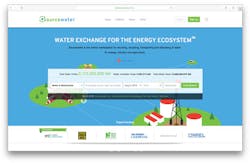Industrial Water Matchmaking - Sourcewater aims to build the water marketplace of the future
One of the major outputs of the oil and gas industry is now water. And while the industry has grown leaps and bounds in the last few years (due largely in part to the increased focus on the hydraulic fracturing industry), the logistics associated with these processes have been slow to catch up.
“This is an industry where, when a guy has a tank that is getting full and he needs disposal, he calls a buddy to send a truck and pick up the water,” said Josh Adler, founder of Sourcewater. “That’s okay when it’s a small operation, and this happens once every couple of weeks where you’re spending $250 to haul a load of water - but what happens when you are spending 50 times that every week? That system becomes completely inadequate.”
Adler set out to change the landscape of industrial water logistics with his website, Sourcewater.com, which he affectionately calls “the Expedia of water.”
In fact, Sourcewater provides visitors with free information about available water resources (both fresh water and wastewater), treatment facilities, shipping/hauling equipment and operators, and other water services for various industries. Visitors can search based on price, location, type of water needed, and other parameters like cost and distance. It’s the first online marketplace for sourcing, transporting, recycling and disposing of water with a focus on the upstream energy industry in the U.S. We spoke with Adler about Sourcewater’s innovative platform and his vision for the future, including finding new uses for wastewater and conserving fresh water.
Industrial WaterWorld: What needs did you see being unmet in the market that led you to develop the Sourcewater platform?
Josh Adler: I am really interested in the energy space, especially unconventional energy because of the rise of hydraulic fracturing and as a totally resurgent energy industry in the U.S. Unconventional energy has gone from basically nothing to a $250 billion per year industry. And, my entrepreneurial intuition was that anything that has gotten that big that fast would have problems that needed fixing.
For the first time, water is by far the largest import into the energy production process. In fracking, there is no enhanced oil recovery (EOR). It doesn’t exist. All of the water that is coming out of the well has to go somewhere for disposal, treatment, or reuse. Over the past five years, there has been a tenfold increase in the amount of water used per well, but water logistics have remained unchanged since the 1950s.
There is a lot of inefficiency and loss, bad information and lack of competition [in the existing systems], so [the Sourcewater platform] is really about bringing those water logistics data and management systems into the 21st century.
IWW: Were you surprised at the response Sourcewater has received?
JA: There has been a lot of interest on the data side of this, so we get lots of visitors to our site who are just searching for water - either water sources or water uses such as disposal, treatment, or reuse. People need this data in order to make better water decisions.
[Initially] we were focused on getting companies to transact, and we had companies doing this, but each one was its own process. We were getting dozens of transactions but thousands of searches and that was when we woke up to the data opportunity.
IWW: How is the data accessed on the site?
JA: We started out with a model that included listings created by users. That was generating data on the site but it was a relatively small volume. [We then added] public data about these assets - like water-source permits, disposal permits, and treatment facility and discharge permits - and co-mingled the listings on the site.
For water, the price is driven much more by the logistics than by the actual commodity price, and it is really about researching things like locations and hauling costs. Is there an opportunity to move it by pipe versus by truck, and what are my option? Is there enough available capacity out there? So, people are coming to our site to find out if there is enough water out there for their purposes in a distance range that would be affordable for their budget. They use this data for planning their well pad. That is not something we originally planned for this platform to do, but it is where we are now and where we went almost immediately after the launch.
IWW: Besides improving the water logistics in oil and gas, what are some of the other industry applications for this platform?
JA: There are so many sources of water out there that aren’t conventional fresh water sources but that can still be very useful and valuable for lots of things.
It just so happens that upstream energy production is the first valuable thing that you can do with really dirty water. And there is no reason to use fresh water because there is plenty of produced water that can be used instead. The idea is that by making wastewater findable, tradeable and valuable, we are creating a massive new water supply without any capital investment - and that is valuable to all industries and all water users. For the people who need fresh water, we are making the fresh water more available, and for the people who don’t need fresh water, they can get a lower price, discount product without having to compete with the fresh water users for it. So, this is good for agriculture, concrete plants, paper mills, oil and gas, and cities, too.
IWW: How has the availability of this information changed the water marketplace?
JA: Having an efficient marketplace is a form of supply-chain insurance. One of the primary benefits of having a transparent, competitive market is that at some price you can always get what you need.
For example, in the oil and gas industry, on the completion side, water and water services only account for about 10 percent of capital costs; and the water itself probably only accounts for about 2 percent, with the other 8 percent being the cost of moving it around. But, if you don’t have every last drop that you need to complete your well before you start the project, you simply cannot operate.
When you have a functioning commodity market, you have operators who are willing to pay twice as much to make sure that they have the water they need because that’s nothing compared to the cost of supply chain breakdown.
That is true on the disposal side, too. In disposal, if you don’t have some place to send this wastewater, you could be in a serious environmental liability situation, and so connecting these operators with disposal centers and a way to get that water there is just as important.
IWW: Where do you see the future of Sourcewater?
JA: There is so much to do in this space. We’ve had some interest in expanding our offering to electronic ticketing of water logistics, for example. What that is really about is being able to efficiently and instantly track and measure the movements of water throughout your supply chain in order to hold vendors accountable, ensure accurate billing, ensure accurate accounting of what you have and where it is. And, there has been a lot of interest in that [in areas] where the level of fraud in water hauling is at least 20 percent of volume. A lot of these issues have been associated with paper ticketing: fraud, waste, and error.
I also really see this as being the water enterprise resource planning (ERP) system because what energy companies are waking up to is that they have more than 10 times as much inventory of water and it accounts for more than half of their total operating budget as compared to what they have for oil and gas; and yet they have nothing in terms of accounting for how much water they have, where it came from, where it went to, how much did it cost, and how much is the risk and where to attribute that cost and risk. They have no systems for that, and I think this is true for a lot of industries and we are going to see that more and more industries will be treating water like the valuable commodity it is.
To learn more, visit sourcewater.com.
About the Author: Alanna Maya is assistant editor for WaterWorld and Industrial WaterWorld magazine. Email her at [email protected].
About the Author
Alanna Maya
Editor
Alanna Maya holds a bachelor’s degree in Journalism from San Diego State University and has more than 10 years of experience writing and editing for national publications. She is the editor for WaterWorld and Industrial WaterWorld magazines, overseeing editorial and web content.



